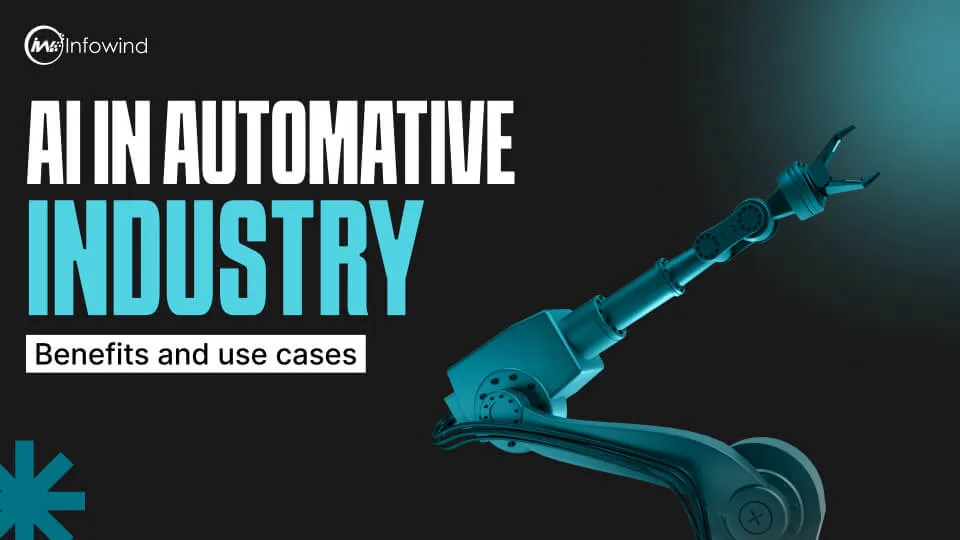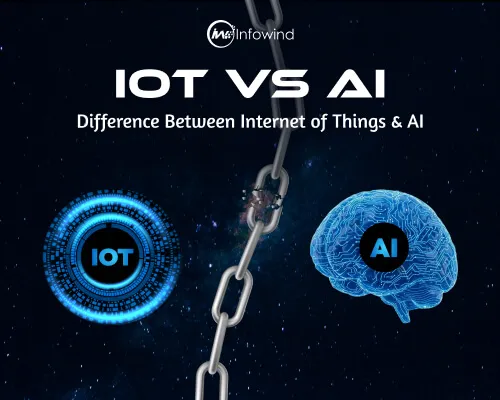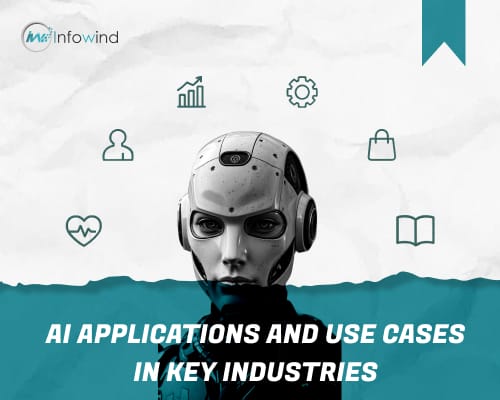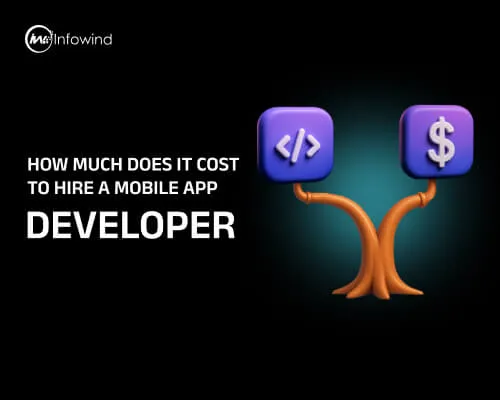The automotive industry is undergoing a significant transformation to rewrite the history of vehicles. From the classic assembly lines to smart, connected cars, artificial intelligence (AI) is shaping the next big wave of innovation. Artificial intelligence in the auto industry is the driving force behind innovation and is revolutionizing how cars are made, driven, and experienced. It enables safer, smarter, and more sustainable mobility options.
Artificial intelligence in automotive use is transforming every industry, and in the automobile industry, vehicle capability enables companies to attain operational superiority, predictive decisioning, and enhanced customer interaction. AI is not just a technological revolution; it has impacted manufacturing to a different extent. This blog explains how AI in the auto industry is developing tangible value, revolutionary use cases, crucial challenges, and emerging trends to observe.
What Is AI in the Context of Automotive?
Automotive AI involves sophisticated and disciplined data-driven algorithms, automation platforms, and learning technologies to simulate human-like problem-solving and decision-making in car-related contexts. Automotive AI adds value at every stage and allows for the processing of enormous amounts of sensor input to permit a car or the networks around it to sense, make predictions, and respond in real-time.
These chief technologies that impel artificial intelligence cars include:
- Machine Learning (ML): It empowers vehicles and systems to learn from road data, traffic patterns, and user behavior. This learning helps to improve over time.
- Computer Vision: Enables detection and interpretation of surroundings through cameras and sensors for lane-keeping, pedestrian detection, and obstacle recognition.
- Natural Language Processing (NLP): It facilitates intuitive voice and gesture-based interfaces.
- Deep Learning: Supports advanced autonomy, situational awareness, and complex decision-making in self-driving systems.
- Edge AI: Processes real-time data directly within vehicles, reducing latency and dependence on cloud infrastructure.
Unlike traditional automation, where tasks follow fixed rules, AI adapts dynamically. It learns continuously from new data, allowing automotive systems to respond intelligently to unpredictable road conditions, driver actions, and environmental factors.
Benefits of AI in the Automotive Industry
AI is fueling innovation at every stage of the vehicle lifecycle—from concept design to post-sale customer engagement. Let’s explore the biggest benefits of automotive artificial intelligence:
Enhanced Driver and Passenger Safety
AI-powered sensors and systems constantly monitor road conditions, driver behavior, and vehicle performance. Features like collision prediction, emergency braking, and drowsiness detection drastically reduce accident risks. Autonomous driving and ADAS (Advanced Driver Assistance Systems) leverage real-time analytics and perception models to ensure safer navigation, even in complex environments.
Improved Manufacturing Efficiency
The automotive manufacturing process is increasingly integrating AI for predictive quality control, robotic vision systems, and process optimization. AI systems detect defects on the assembly line, forecast equipment maintenance needs, and streamline production scheduling—preventing costly downtime. For example, AI-powered robots at Toyota and Volkswagen enhance efficiency, precision, and consistency in manufacturing operations.
Cost Optimization Through Predictive Maintenance
AI-driven predictive maintenance analyzes data from sensors, engine performance, and historical trends to forecast part failures before they occur. Brands like BMW and Ford use these systems to improve reliability, reduce warranty claims, and minimize unplanned maintenance costs.
Personalized Driving Experiences
Using driver profiling and behavioral data, artificial intelligence in cars enables deeply personalized experiences—from adaptive seat configurations and preferred climate control settings to voice-controlled infotainment systems that respond to natural speech. Mercedes-Benz’s MBUX and Tesla’s infotainment platform exemplify seamless human-machine interaction.
Energy Efficiency and Smart Route Planning
AI algorithms process real-time data from maps, traffic, and weather to determine the most energy-efficient and fastest routes. This is essential for optimizing fuel consumption in traditional cars and extending range in electric vehicles (EVs). AI-enabled navigation systems also contribute to smarter city infrastructure by minimizing congestion and emissions.
Competitive Advantage for Automotive Brands
Embracing AI in the automobile industry provides automakers with a strategic edge. Data-driven decision-making, intelligent supply chain management, and customer-centric innovation differentiate leaders like Tesla, Hyundai, and General Motors from their competitors. AI insights help automotive brands anticipate market needs and evolve faster than the competition.
Real-World Use Cases of AI in Automotive
AI in the automotive ecosystem is already creating a measurable impact. Let’s explore some prominent use cases:
Autonomous Vehicles (AVs)
Companies like Tesla, Waymo, and Cruise are at the forefront of autonomous driving technologies. These vehicles use deep learning-based perception systems, computer vision, radar, and LiDAR to identify obstacles, interpret traffic signals, and make complex navigation decisions in real time. Self-driving cars rely heavily on AI to balance safety, comfort, and efficiency.
Advanced Driver Assistance Systems (ADAS)
ADAS features are widely integrated into modern vehicles. Lane-keeping assist, adaptive cruise control, pedestrian detection, and automated parking all depend on AI-driven sensor fusion and pattern recognition. These systems represent a critical transitional stage toward full autonomy.
Predictive Maintenance
By deploying machine learning models, automotive brands can predict part wear and mechanical issues before they lead to breakdowns. BMW and Ford, for instance, employ AI to analyze vehicle telemetry data, reducing unscheduled repairs while improving reliability and after-sales service.
Smart Manufacturing
AI-powered robots and sensors are revolutionizing automotive production. Toyota uses vision-based AI robots capable of precise assembly, welding, and inspection. Intelligent automation not only boosts output but also ensures consistent quality and worker safety.
Voice and Gesture Recognition
Mercedes-Benz’s MBUX, Ford’s SYNC, and BMW’s Intelligent Personal Assistant represent how NLP and gesture recognition enhance user interaction. These AI-powered infotainment systems make driving more intuitive and safer by minimizing manual distractions.
AI in Supply Chain Management
AI optimizes supply chain operations through real-time logistics tracking, demand forecasting, and supplier risk analysis. The result is reduced waste, improved delivery accuracy, and greater resilience in global operations—a critical need for automotive manufacturers navigating uncertain markets.
Insurance and Telematics
Usage-based insurance (UBI) models powered by AI analyze driving patterns, vehicle data, and environmental conditions to determine premiums more fairly. Insurance providers leverage telematics to reward safe driving habits and prevent fraudulent claims.
Challenges and Considerations
Despite its transformative potential, implementing artificial intelligence in automotive industry practices comes with significant challenges.
Data Privacy and Cybersecurity
Connected vehicles constantly exchange vast amounts of data. Protecting this sensitive information from cyberattacks and misuse remains a crucial priority.
High R&D and Infrastructure Costs
Developing robust AI models, upgrading sensors, and ensuring reliable connectivity require extensive financial resources.
Regulatory Hurdles
Policymakers and automakers must align on safety standards, data usage laws, and ethical frameworks for AI-guided decision-making.
Ethical Implications
AI-driven decisions—such as collision avoidance in critical moments—raise complex ethical questions regarding accountability and bias.
Overcoming these challenges calls for standardized protocols, transparent data usage policies, and public-private collaboration to ensure safe, scalable integration of AI across the automotive value chain.
Future Trends in Automotive AI
The evolution of automotive artificial intelligence is accelerating, and several promising trends are shaping its next chapter:
AI-Enabled Electric Vehicles (EVs)
Combining AI with electromobility is unlocking smarter, more efficient EV performance. From battery health management to regenerative braking optimization, AI maximizes energy use while learning from driver behavior.
Federated Learning for Car Data Privacy
To address privacy concerns, federated learning enables vehicles to train AI models locally—sharing improvements without transmitting raw data to central servers. This enhances privacy and reduces network dependence.
Explainable AI (XAI) in Safety-Critical Systems
As AI oversees increasingly critical driving decisions, explainability becomes essential. XAI ensures that algorithms can justify their choices, improving transparency, compliance, and user trust.
AI + 5G for V2X Communication
The fusion of 5G and AI is revolutionizing vehicle-to-everything (V2X) communication. Real-time data sharing among cars, infrastructure, and pedestrians enhances traffic management, collision prevention, and urban mobility efficiency.
When and Why to Consider Implementing AI in Automotive Businesses
For automotive manufacturers, suppliers, and mobility startups, integrating AI is not just a technological decision; it’s a strategic imperative.
Depending on the company’s expertise, maturity, and goals, AI development can be introduced at different stages. With AI in Automotive businesses, it can focus on customer personalization and fleet optimization. The data capabilities and expertise tend to grow with experience in AI development for an organization.
Infowind Technologies, an AI development company, is ready for AI integration. We have developed amazing, intuitive AI-enabled software that has brought a revolution in the industry. With flawless development, the organization is a pro in maintenance, production, and logistics. The team aims to personalize user experiences and boost sustainability performance. A top AI development company understands engineering as well as data science.
The predictive automation improves uptime, cutting maintenance costs by up to 30%. The smarter supply chain forecasting reduces inventory waste, and personalized customer engagement elevates brand loyalty and recurring sales.
In essence, the best time to adopt AI in the automotive sector is now. As the industry becomes more data-centric and connected, those who move early will lead the next generation of intelligent mobility—turning innovation into a practical, measurable advantage.
Collaborating with experienced AI development firms helps translate innovation into practical solutions. Trusted partners can deliver end-to-end implementation, data architecture, model training, system integration, and post-deployment analytics, ensuring business goals align with technical feasibility.
Final Thoughts
AI is redefining what vehicles can do and how companies operate. The rise of artificial intelligence in the automotive industry trends is ushering in safer roads, cleaner mobility, and superior driving experiences. From autonomous cars to smart factories, AI is no longer a futuristic concept—it’s the present-day competitive advantage.
Organizations that harness AI in automobile industry innovations today will shape the future of mobility tomorrow. Whether you’re an automaker, supplier, or mobility service provider, this is the moment to explore AI integration that drives measurable value across your business.




